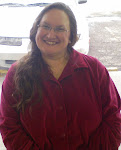Without sounding ungrateful for the space that I do have, there are times when I wish that I had more room to share some of the great information that I get from people in interviews. (Whether my readers share in that wish is yet another story--they may be rather grateful that there is a limit to my ramblings--unlike in this space).
We're very fortunate in that most people in the local arts community are pretty eloquent when it comes to talking about what they do. They may not always believe that they are--in fact, it is not uncommon or infrequent for people to apologize, claiming that they lack the ability to put what they do into words. This they'll say after they've just spoken passionately about their latest project.
Perhaps that is because what comes out of our mouth rarely has the depth or complexity of what is going on in our heads and as speakers we are intimately aware of the gap between the two. Thankfully, those we speak to are unaware of the gap unless we enlighten them.
But I'm getting off topic, aren't I? This is what happens when you take away the discipline of word limits. :)
Two weeks ago, I met with Melissa Kaplan, the performing arts coordinator for Lansing Community College. I had the good fortune to work with her nearly ten years ago when she was a video producer for the American Hotel & Lodging Educational Institute. As a writer/editor in the special projects department, I would sometimes work with her to create print material to go with the training videos.
Five years ago, she started working as the performing arts coordinator at Lansing Community College and I quickly began seeing her everywhere around town. She is one of those people who is truly a patron of the arts. She doesn't limit herself to those things that she is involved in, but who immerses herself into the art in the community, filling that crucial role of "audience."
In the weekend before I met with her, she had attended a Lansing Symphony Orchestra Masterworks Concert on Friday, Peppermint Creek's A New Brain on Saturday, the La Batterie drum concert at LCC on Sunday, and then went to the movies to see the film-adapted musical Sweeny Todd on Monday. She is someone for whom taking int he arts is a habit, a way of life. It is people like that who are the life blood of arts in any community.
One of the things that we talked about was audience development. How do you get people to take the risk on attending a live performance? Movies are fairly low risk despite the high price tag on tickets. You can read numerous reviews and blogs on every movie and have probably seen previews of a show either online or at another movie. Most arts organizations don't do "previews" before their current show--though perhaps they could if rehearsals for the next show have already begun. It's likely to be pretty cost prohibitive, though.
Even for those of us who do recognize the value of arts and try to partake in them as much as possible, there are days when it is simply far easier to stay at home. There are dishes that need doing, books calling to be read, people to chat with online, or even naps to be taken in our increasingly sleep-deprived world. Those of us in the habit of going to live performances can usually motivate ourselves with the knowledge that once we get there, we'll be glad that we did. Even bad performances can be rewarding and worth the time spent. However, that's knowledge gained from experience. How do you get people to gain the experience?
One of the things that I've noticed is that even people heavily involved in the arts don't necessarily go to see anything other than what they or someone they've worked with are involved in. It's why people like the Milsteins, the Zussmans, Melissa Kaplan, and many others are such treasures. (And yes, I'm leaving out the media folk who go as part of their work--though that in itself takes a certain level of devotion and commitment that goes beyond the paycheck.)
There's a woman whose name I don't know that I can always count on seeing at any MSU production. LCP has a patron who has attended every single show since they started more than 70 years ago. The Lansing Symphony Orchestra has devoted patrons who will send out e-mails with in-depth analyses of upcoming concerts.
What can be done to multiply the numbers of people like these? How can audience members be turned from patrons to loyal advocates?
For that matter, how do we get people to live performances in the first place? I'm a firm believer that if you can get people there, the art will do the work. They'll come to understand why art is important and why it can make a difference in people's lives. It's important the way that sports is important. It is a recreation that gives us a common language by which to talk with each other.
Wednesday, February 6, 2008
Subscribe to:
Post Comments (Atom)




No comments:
Post a Comment